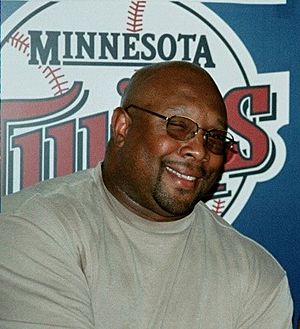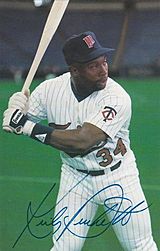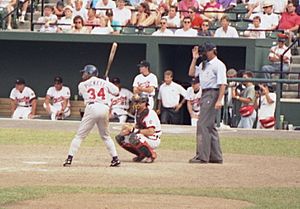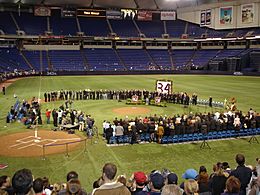Kirby Puckett facts for kids
Quick facts for kids Kirby Puckett |
|||
|---|---|---|---|

Puckett in 1997
|
|||
| Center fielder | |||
| Born: March 14, 1960 Chicago, Illinois, U.S. |
|||
| Died: March 6, 2006 (aged 45) Phoenix, Arizona, U.S. |
|||
|
|||
| debut | |||
| May 8, 1984, for the Minnesota Twins | |||
| Last appearance | |||
| September 28, 1995, for the Minnesota Twins | |||
| MLB statistics | |||
| Batting average | .318 | ||
| Hits | 2,304 | ||
| Home runs | 207 | ||
| Runs batted in | 1,085 | ||
| Teams | |||
|
|||
| Career highlights and awards | |||
|
|||
| Induction | 2001 | ||
| Vote | 82.14% (first ballot) | ||
Kirby Puckett (born March 14, 1960 – died March 6, 2006) was an amazing American professional baseball player. He played his entire 12-year career in Major League Baseball (MLB) as a center fielder for the Minnesota Twins. Puckett is known for being the Twins' all-time leader in career hits, runs, and total bases.
When he retired, his .318 career batting average was the best for any right-handed batter in the American League since the legendary Joe DiMaggio. Kirby Puckett was one of only a few players in the 20th century to get 1,000 hits in his first five years. He was also one of the fastest to reach 2,000 hits in his first ten years. Sadly, he had to retire in 1996 because he lost vision in one eye. In 2001, he was elected into the Baseball Hall of Fame on his very first try.
Contents
Early Life and Baseball Dreams
Kirby Puckett was born in Chicago, Illinois. He grew up in a housing project on Chicago's South Side. He played baseball for Calumet High School. After high school, he didn't get any scholarship offers for college.
Kirby then worked on an assembly line for Ford Motor Company. But he got a chance to go to Bradley University and later transferred to Triton College. Even though he was 5 feet 8 inches tall, the Minnesota Twins picked him in the first round of the 1982 MLB draft.
After joining the Twins, he played for the rookie-league Elizabethton Twins. He hit an impressive .382 and stole 43 bases in 65 games. In 1983, he moved up to the Single-A Visalia Oaks. There, he hit .318 with 9 home runs and 48 stolen bases. In 1984, after playing just 21 games for the AAA Toledo Mud Hens, Puckett was called up to the major leagues.
Kirby's MLB Career Begins
Kirby Puckett made his big league debut on May 8, 1984. He played against the California Angels. In that game, he got 4 hits in 5 tries and scored one run. That year, Puckett hit .296 and was one of the best in the American League for singles.
In 1985, he hit .288 and was among the league leaders in hits and at-bats. Throughout his career, Puckett was always near the top in important stats. These included games played, at bats, singles, doubles, and total bases. He was also great defensively, with many putouts, assists, and a high fielding percentage as a center fielder.
In 1986, Puckett became more than just a player who hit singles. He hit .328 and was chosen for his first Major League Baseball All-Star Game. He finished the season high in many stats like home runs and runs scored. Kirby also won his first Gold Glove Award for his amazing defense.
First World Series Win (1987–1990)
In 1987, the Twins made it to the postseason for the first time since 1970. Puckett helped lead them to the 1987 World Series. This was the Twins' second World Series since moving to Minnesota. For the season, Puckett batted .332 with 28 home runs and 99 RBIs.
Even though he hit only .208 in the 1987 American League Championship Series against the Detroit Tigers, Puckett played great in the World Series. He batted .357 as the Twins upset the St. Louis Cardinals. On August 30, 1987, Puckett had an incredible game in Milwaukee. He got 6 hits in 6 tries, including two home runs!
In 1988, Puckett had his best all-around season. He hit 24 home runs with a career-high .356 batting average and 121 RBIs. He finished third in the AL MVP voting. Even though the Twins won more games than in their championship year, they didn't make the playoffs.
Puckett won the AL batting title in 1989 with a .339 average. He also led the league in hits. In April 1989, he got his 1,000th hit. He was only the fourth player in MLB history to do this in his first five seasons. He continued to play well in 1990, but the Twins had a tough year, finishing last in their division.
Second World Series Win (1991–1995)
In 1991, the Twins started winning again, and Puckett was a key reason. He batted .319, and Minnesota won their division. The Twins then beat the Toronto Blue Jays in the 1991 American League Championship Series. Puckett batted an amazing .429 with two home runs and five RBIs, earning him the ALCS MVP award.
The 1991 World Series against the Atlanta Braves is considered one of the best ever. Four games were decided on the last pitch, and three went into extra innings. Both teams had finished last in their divisions the year before, which was a first!
Going into Game 6, the Twins were down three games to two. Puckett started the game strong with a triple that drove in a run. Later, he made an amazing leaping catch in left field to stop a hit. The game went into extra innings. In the bottom of the 11th inning, Puckett hit a dramatic game-winning home run! This sent the Series to a Game 7. This home run is a famous moment in baseball history and a highlight of Puckett's career. The Twins went on to win Game 7 by a score of 1–0, winning their second World Series in five years.
Even though the Twins didn't make the playoffs again during Puckett's career, he remained a top player. In 1994, he moved to right field. He won his first league RBI title, driving in 112 runs in just 108 games. However, the 1994 season ended early due to a players' strike. In 1995, Puckett was still playing well. His career ended when he broke his jaw after being hit by a pitch on September 28.
Retirement from Baseball
 |
|
| Kirby Puckett's number 34 was retired by the Minnesota Twins in 1997. |
In the spring of 1996, Puckett was playing great in spring training. But on March 28, he woke up and couldn't see out of his right eye. He was diagnosed with glaucoma, an eye condition. This was the first time he had ever been on the disabled list.
He had three surgeries, but they couldn't fix his vision. When it was clear he couldn't play baseball anymore, Puckett announced his retirement on July 12, 1996, at age 36. The Twins then made him an executive vice-president for the team. He also received the 1996 Roberto Clemente Award for his community service.
The Twins retired Puckett's number 34 in 1997. In 2001, he was elected into the Baseball Hall of Fame in his first year of being eligible. In 1999, The Sporting News ranked him as the 86th greatest baseball player.
Kirby Puckett was admired by many throughout his career. His amazing baseball skills, friendly personality, and charity work made him a beloved figure. In 1993, he received the Branch Rickey Award for his community service.
Death and Lasting Legacy
On March 5, 2006, Kirby Puckett suffered a serious stroke. He had emergency surgery to help his brain, but it was not successful. His former teammates and coaches were told that his death was near. Many of them, including Shane Mack and Kent Hrbek, flew to Phoenix to be with him. Kirby Puckett passed away on March 6, 2006, at 45 years old.
The cause of death was a "cerebral hemorrhage due to hypertension" (high blood pressure). He was survived by his son, Kirby Jr., and his daughter, Catherine.
A private memorial service was held in Minnesota. Then, a public ceremony took place at the Metrodome. About 15,000 fans, along with family and friends, attended. Speakers included Hall of Famers Harmon Killebrew, Cal Ripken Jr., and Dave Winfield.
On April 12, 2010, a statue of Puckett was revealed at Target Field in Minneapolis. The statue shows Puckett pumping his fist as he ran the bases. This was how he celebrated his winning home run in Game 6 of the 1991 World Series.
When Boston Red Sox player David Ortiz retired in 2016, he said he wore uniform number 34 to honor his friendship with Puckett. Ortiz started his MLB career with the Twins.
See also
 In Spanish: Kirby Puckett para niños
In Spanish: Kirby Puckett para niños
- DHL Hometown Heroes
- List of Major League Baseball annual runs batted in leaders
- List of Major League Baseball batting champions
- List of Major League Baseball career doubles leaders
- List of Major League Baseball career hits leaders
- List of Major League Baseball career runs batted in leaders
- List of Major League Baseball career runs scored leaders
- List of Major League Baseball hit records
- List of Major League Baseball players to hit for the cycle
- List of Major League Baseball players who spent their entire career with one franchise
- List of Major League Baseball single-game hits leaders
- Major League Baseball titles leaders
 | Stephanie Wilson |
 | Charles Bolden |
 | Ronald McNair |
 | Frederick D. Gregory |




